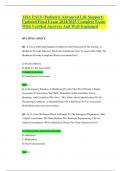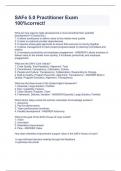Exam (elaborations)
AHA PALS (Pediatric Advanced Life Support) Updated Final Exam 2024/2025 Complete Exam With Verified Answers And Well Explained
AHA PALS (Pediatric Advanced Life Support) Updated Final Exam 2024/2025 Complete Exam With Verified Answers And Well Explained MULTIPLE CHOICE Q1. A 4-Year-Old Child Suddenly Collapses In The Playroom Of The Facility. A Healthcare Provider Observes The Event And Hurries Over To Assess The ...
[Show more]




